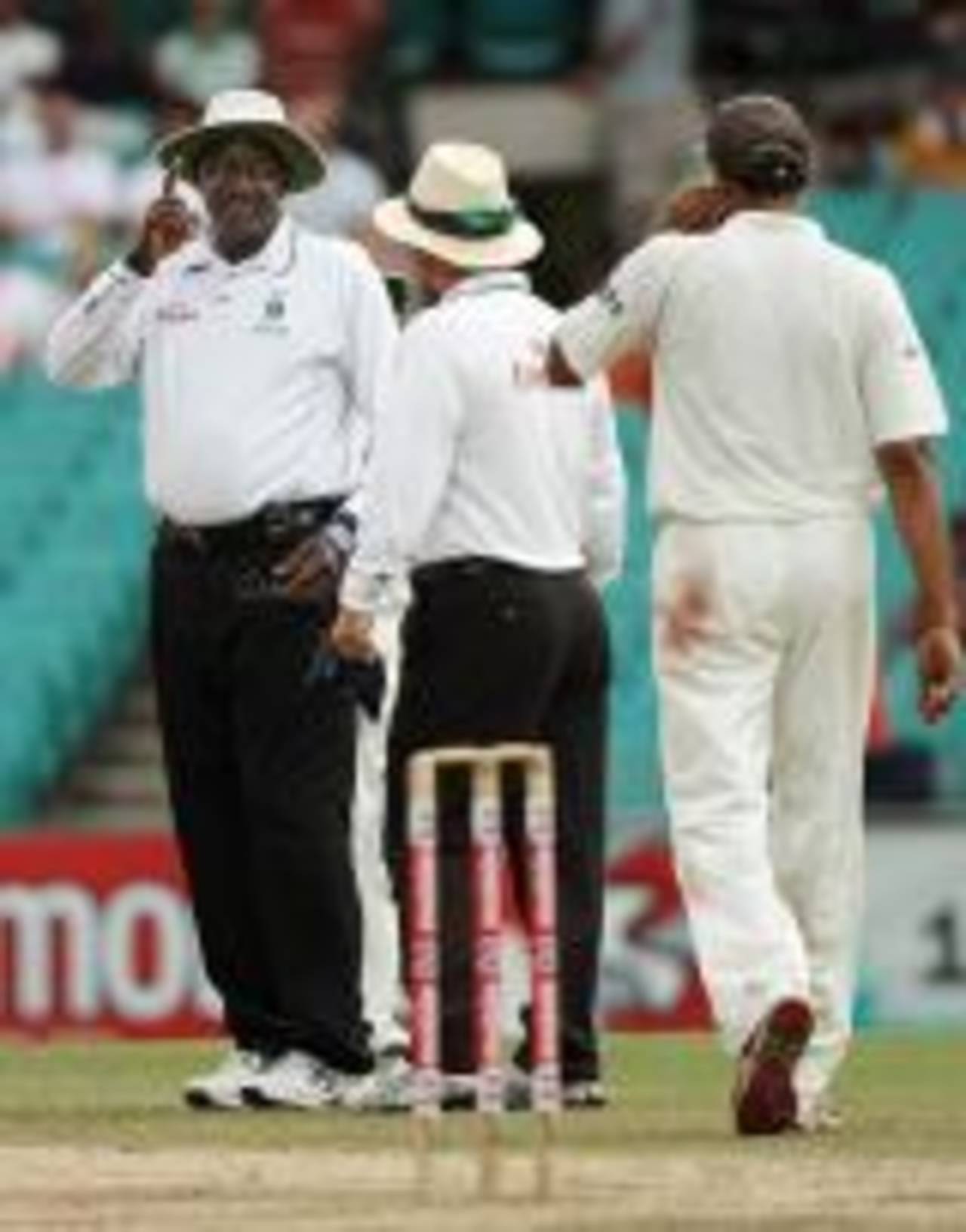India lost the Sydney Test because the umpiring was one-sidedly awful. It was good to see Kumble and his team-mates shake hands with the Australians but formal salutation is where congratulations should stop. This was a Test match where the excitement was manufactured by incompetent umpires making weird decisions: the Indians players must have felt like lab rats being chivvied by mad scientists.
While previewing the present series in this blog, I wrote that for the Indians to have a chance the umpires would have to hold their nerve. Well, they didn’t. Test series in Australia have in recent years have followed a pattern: the touring team struggles to to hold its own against the superior home team; then, at vital moments when the beleaguered tourists have a chance of saving the game or winning it, they get a shocker. Or two. Or three. In the Sydney Test the Indians lost count.
I’m not even thinking about lbw decisions which are judgement calls: we’re talking about audible edges being given not out [Ricky Ponting, Andrew Symonds, Michael Hussey], a stumping against Symonds not being given by the third umpire despite video evidence to the contrary, a stumping where Symonds’ heel was raised not referred to the third umpire by Steve Bucknor, a non-existent edge given against Rahul Dravid when his bat wasn’t in the same latitude as the ball and perhaps, most infuriatingly, Sourav Ganguly given out, caught by Michael Clarke because the fielder said so. Benson didn’t ask the square-leg umpire for confirmation, he asked the Australians. The Indians could be forgiven for thinking that a player who had bizarrely stood his ground after being caught off a massive edge, and who had just dropped a sitter off the same batsman, mightn’t qualify as a neutral witness.
To those who would say that Ponting refused to claim a catch in similar circumstances in the first innings, the point is that whether an umpire decides in principle to refer to the third umpire or not, he needs to make his decisions on the basis of his own judgement or by conferring with his fellow umpire, not on the testimony of an interested party, the fielder. Circumstances alter cases: the same Ponting in India’s tense second innings tried to claim a catch that he hadn’t completed [the ball in his hand hit the ground as he completed his dive].
Why do touring teams get such shockers from neutral umpires? I don’t know. Perhaps umpires prefer their appealing technique, perhaps the Australians, as the dominant team, get the benefit of any doubt, but the point at which opposing teams and their supporters begin to despair is when they get a decision like the one Kumar Sangakkara got from Rudi Koertzen, given out caught off a ball that wasn’t near his bat at a point in the match where Sangakkara was leading an unlikely Sri Lankan resurgence.
The Australians have become so used to dodgy decisions going their way that it reflects in their onfield manner. Most batsmen stand their ground when they think they’ve got a faint edge that the umpire mightn’t have noticed; they generally leave when their edges echo round the stadium. When Clarke was caught in slip by Dravid off Anil Kumble the reason he stood his ground despite the deviation and the sound was because he had learnt both from long experience and Symonds’ good fortune in the first innings, that there was a decent chance he would be reprieved. The horror on Kumble and Dravid’s face when they saw he was sanding his ground was comical: their second appeal which Bucknor finally upheld was a masterpiece of disbelieving desperation.
If Benson was incompetent, Bucknor was incompetent and perverse. The moment that summed up this match’s inexplicably bad umpiring was Bucknor’s decision not to refer Dhoni’s appeal for a stumping against Symonds to the third umpire. What was he thinking? Bucknor and the Indians have have a long history of friction and this last performance by him is unlikely to improve things. He is scheduled to stand in the Perth Test: I’d be very surprised if the Indians don’t formally petition the authorities to substitute him. If I was Bucknor, I’d withdraw and use the time to see an opthalmologist: his dismissal of Dravid in the second innings suggests that he’s seeing things.
Looking to the future and how the game can deal with human error, I think Peter Roebuck has the right ideas. The ICC should take a page out of tennis’ book and allow each team a fixed number of challenges so that they can appeal decisions that they think are plainly wrong. Tennis allows three challenges; given umpires of the quality of Benson and Bucknor, half a dozen might be too few. But seriously, if competitive Test matches aren’t to be ruined and if, in particular, Australian tours are to remain credible, cricket’s authorities need to act now.
Mukul Kesavan is a writer based in New Delhi

